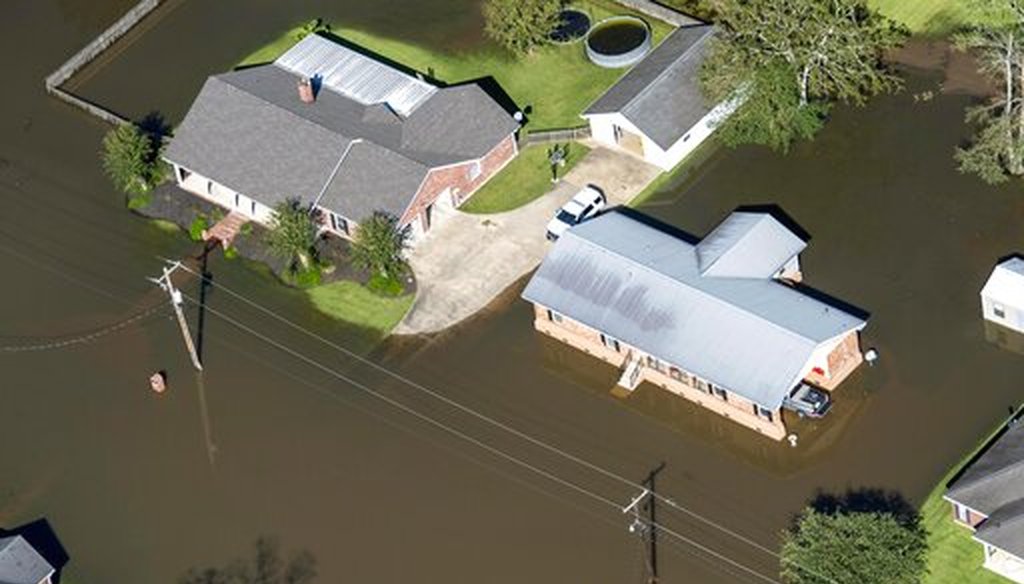

Our only agenda is to publish the truth so you can be an informed participant in democracy.
We need your help.


Houses surrounded by flood waters are seen in the aftermath of Hurricane Delta Saturday Oct. 10, 2020, in Welsh, La. (AP)
Hurricanes are formed when humid air flows upward in a low-pressure zone over warm ocean water. That water is then released from the air, and as it rises, the air rotates in a circular motion.
The pandemic-era hurricane seasons of 2020 and 2021 marked the first and third most active Atlantic seasons on record, respectively, according to the National Hurricane Center.
Everyone knows 2020 and 2021 were full of news. There was a global pandemic, an American presidential election, a massive attack on the U.S. Capitol.
But an Instagram video suggests there was one newsworthy event that someone "forgot" to make happen — a hurricane.
"So covid was so bad one year, they forgot to give us a hurricane?" reads overlay text on the video posted Oct. 1. It shows a man filming himself walking on a cloud-covered beach as waves crash in the background. He’s shaking his head. "What’s really going on here?" the post’s caption reads.
The post was flagged as part of Instagram’s efforts to combat false news and misinformation on its News Feed. (Read more about our partnership with Meta, which owns Facebook and Instagram.)
It is wrong on two fronts. First, hurricanes are formed in nature, not orchestrated by people, so there’s no conspiracy afoot, though we have seen a number of social media posts falsely claiming otherwise. Second, hurricane activity did not subside after the COVID-19 pandemic began.
In fact, 2020 and 2021 marked the first and third most active Atlantic hurricane seasons on record, respectively, according to the National Hurricane Center.
In 2020, the center recorded at least 30 tropical cyclones. Fourteen of them were hurricanes, according to the data.
Seven of those systems produced major hurricanes of Category 3 strength or higher, meaning they had maximum sustained wind speeds of 111 mph or higher. These included Category 4 Hurricane Laura and Category 3 Hurricane Zeta, both of which made landfall in Louisiana.
"Every single mile of the mainland U.S. Atlantic coast, from Texas to Maine, was under a watch or warning related to tropical cyclones at some point in 2020," Jeff Masters, co-founder of Weather Underground, an online weather information service, wrote in an analysis published by Yale Climate Connections.
The 2021 hurricane season saw 21 named storms — the third-highest on record. Of those, four were classified as major hurricanes, including Category 4 Hurricane Ida, which dealt catastrophic damage to Louisiana when it made landfall in the state’s southeastern region.
Hurricanes are formed when humid air flows upward in a low-pressure zone over warm ocean water. That water is then released from the air, and as it rises, the air rotates. The longer a system stays over warm water, the stronger and more dangerous it becomes. Hurricanes tend to peak between the end of June and beginning of November.
"We cannot create hurricanes nor can we throw them anywhere we want to," Andrew Dessler, a professor of atmospheric sciences and the director of the Texas Center for Climate Studies at Texas A&M University previously told PolitiFact. "Hurricanes are not manifestations of our thoughts. If we didn’t believe in Hurricane Ian, it would still pummel the west coast of Florida."
An Instagram video said "so was COVID so bad they just forgot to give us a hurricane?" and suggested something conspiratorial was going on.
Hurricanes are formed in nature, not orchestrated by people, so there’s no conspiracy regarding storm exposure. And hurricane activity did not subside after the COVID-19 pandemic began — 2020 and 2021 marked the first and third most active Atlantic hurricane seasons on record.
We rate this claim Pants on Fire!
Instagram post (archived), Oct. 1, 2022
National Hurricane Center, "2020 Atlantic Hurricane Season Summary Table," accessed Oct. 6, 2022
National Hurricane Center, "2020 Atlantic Hurricane Season," accessed Oct. 6, 2022
National Hurricane Center, "Tropical Cyclone Climatology," accessed Oct. 6, 2022
Yale Climate Connections, "A look back at the horrific 2020 Atlantic hurricane season," Dec. 1, 2020
Yale Climate Connections, "Top 10 weirdest things about the bonkers 2021 Atlantic hurricane season," Nov. 30, 2021
In a world of wild talk and fake news, help us stand up for the facts.
